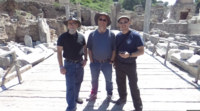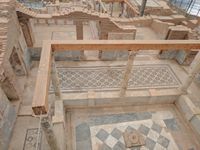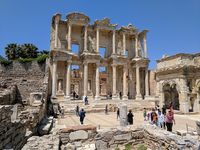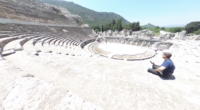Sermon for March 31st, 2024
Matthew 28:1-10 (NT p.33)
28 After the Sabbath, as the first day of the week was dawning, Mary Magdalene and the other Mary went to see the tomb. 2 And suddenly there was a great earthquake, for an angel of the Lord, descending from heaven, came and rolled back the stone and sat on it. 3 His appearance was like lightning and his clothing white as snow. 4 For fear of him the guards shook and became like dead men. 5 But the angel said to the women, “Do not be afraid; I know that you are looking for Jesus who was crucified. 6 He is not here; for he has been raised, as he said. Come, see the place where he lay. 7 Then go quickly and tell his disciples, ‘He has been raised from the dead, and indeed he is going ahead of you to Galilee; there you will see him.’ This is my message for you.” 8 So they left the tomb quickly with fear and great joy, and ran to tell his disciples. 9 Suddenly Jesus met them and said, “Greetings!” And they came to him, took hold of his feet, and worshiped him. 10 Then Jesus said to them, “Do not be afraid; go and tell my brothers to go to Galilee; there they will see me.”
Ephesians 1:1-23 (NT p.191)
1 Paul, an apostle of Christ Jesus by the will of God, To the saints who are in Ephesus and are faithful in Christ Jesus: 2 Grace to you and peace from God our Father and the Lord Jesus Christ.
3 Blessed be the God and Father of our Lord Jesus Christ, who has blessed us in Christ with every spiritual blessing in the heavenly places, 4 just as he chose us in Christ before the foundation of the world to be holy and blameless before him in love. 5 He destined us for adoption as his children through Jesus Christ, according to the good pleasure of his will, 6 to the praise of his glorious grace that he freely bestowed on us in the Beloved. 7 In him we have redemption through his blood, the forgiveness of our trespasses, according to the riches of his grace 8 that he lavished on us. With all wisdom and insight 9 he has made known to us the mystery of his will, according to his good pleasure that he set forth in Christ, 10 as a plan for the fullness of time, to gather up all things in him, things in heaven and things on earth. 11 In Christ we have also obtained an inheritance, having been destined according to the purpose of him who accomplishes all things according to his counsel and will, 12 so that we, who were the first to set our hope on Christ, might live for the praise of his glory. 13 In him you also, when you had heard the word of truth, the gospel of your salvation, and had believed in him, were marked with the seal of the promised Holy Spirit; 14 this is the pledge of our inheritance toward redemption as God's own people, to the praise of his glory.
15 I have heard of your faith in the Lord Jesus and your love toward all the saints, and for this reason 16 I do not cease to give thanks for you as I remember you in my prayers.
17 I pray that the God of our Lord Jesus Christ, the Father of glory, may give you a spirit of wisdom and revelation as you come to know him, 18 so that, with the eyes of your heart enlightened, you may know what is the hope to which he has called you, what are the riches of his glorious inheritance among the saints, 19 and what is the immeasurable greatness of his power for us who believe, according to the working of his great power. 20 God put this power to work in Christ when he raised him from the dead and seated him at his right hand in the heavenly places, 21 far above all rule and authority and power and dominion, and above every name that is named, not only in this age but also in the age to come. 22 And he has put all things under his feet and has made him the head over all things for the church, 23 which is his body, the fullness of him who fills all in all.
United We Stand, Part I
Some people like to keep track of how many steps they take each day or how many calories they burn in a workout. Some people track the value of their investment portfolio, or their retirement account. I'm a pastor, so one of the things I like to track is the number of sermons I've preached to you, right here in this room, over the course of the past 13 years. Today happens to be sermon number 500. I promise, I didn't plan it this way, for my 500th sermon to occur right on Easter Sunday (but maybe God did).
In thinking about those 500 sermons, I'm reminded of the story about three friends who went bow hunting together. One was a lawyer, another was an accountant, and the third friend was their pastor. Early in the morning, a beautiful 12 point buck came into their deer blind, and all three friends were so excited that they drew their bows and fired their arrows at exactly the same time. Only one arrow hit the buck, however, and the friends began to argue about whose shot it was. After awhile, the game warden came by, and they asked him to settle the issue. After a careful examination, the game warden said, "Clearly, it was the pastor who hit the buck." The accountant and the lawyer demanded to know how the game warden could tell with such certainty. "Easy," said the game warden. "You see this arrow? It had to be the Pastor's. The point went in one ear, and right out the other."
So... thank you for listening through the years (or at least pretending to), for humoring all my really bad jokes, and hopefully at least a few of those points landed where they needed to!
Here's something else I didn't plan (but maybe God did!): Last summer, when I chose the text and the title for our Easter sermon series on the Book of Ephesians, "United We Stand" I had no idea that I'd be preaching to a combined service of two of the longest-established Protestant churches in our city, First Christian Church and First Presbyterian Church. And of course, the entire book of Ephesians is about two communities coming together to form a unified Christian witness in their city.
Clearly God knows what he's doing, even when the preacher doesn't yet.
Right about now, some of you may be thinking, "that's all nice and good, but what does any of this have to do with Easter Sunday, the empty tomb, and the resurrection story? And (as you should always ask of any sermon), what does this have to do with us, today? I promise, I'm going to get to that eventually, but first we're going to take a detour, some fifty or sixty years *after* that first Easter Sunday, six hundred miles west of Jerusalem to the ancient Roman city of Ephesus, which is in modern-day Turkey.
In 2017, I had the opportunity to visit Ephesus with two dear friends, Michael Simants and James Holt. Michael and his family were living in Turkey at the time. Even in its ruined state, the city of Ephesus was beautiful, magnificent, and really vast.
In its heyday, around the time of Jesus and Paul, Ephesus was the second largest city in the Roman Empire, in terms of population, geographic size, and importance. So it's probably not too surprising that in the earliest days of Christianity, the apostle Paul personally traveled to Ephesus and started a very successful church there--one that welcomed both Jewish followers of Christ as well as Gentile converts. We read in the book of Acts that the church was so successful it harmed the local economy, because all the new converts to Christianity stopped buying silver idols of the local deity, the Greek goddess Artemis. Eventually Paul moved on to start churches in other cities, but he kept in touch with the church in Ephesus. According to church tradition, he wrote the letter to the Ephesians during his first imprisonment in Rome.
The first chapter of Ephesians, which is our text today, functions as a microcosm (or a preview) of the entire book, which is divided in to two halves: The first half lays out all the things that God has done for us, through Christ, and all of the blessings that come with living a life of faith. The second half (of both the book and the first chapter) paints a picture of what that kind of life should look like, centered around the theme of Unity and the metaphor of the church as the Body of Christ.



